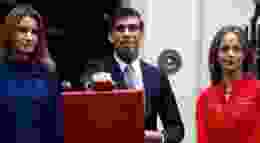
We need the open sea
The only rational approach to Britain's negotiations with the EU is to choose a clean break and opt for global rules of trade provided by the WTO. In other words to opt for a 'no deal', argues John Longworth.
As I return from a summer sojourn to French Savoie I see all too clearly that we are again re running the recurring historical mazourka with our continental cousins.
On so many occasions through a thousand years of history Britain has tried, at times successfully, to avoid enmeshment in continental matters and instead reach out to the world. Sometimes this has led to open conflict, often to amnity and certainly to a belief in France in the myth of perfidious Albion.
It was Winston Churchill who told de Gaul that if faced with a choice between Europe and the open sea, England would always choose the open sea.
When I met with the EU Chief Negotiator, Michel Barnier, to discuss our exit from the EU, he was at pains to pronounce a number of times that he was a Gaullist. I must say at the time the implications of this were not entirely clear to me, albeit his behaviour certainly reflects what I have since discovered.
Charles de Gaul was someone who Churchill promoted and protected and who successfully wrote himself into French history, alongside Napoleon, as one of the greatest Frenchmen. The full implications of being a fan of his however, are lost on most modern Brits.
Charles de Gaul disliked Britain. He perpetuated the belief, promulgated by his Vichy adversary Petain, that the defeat of France by Germany in World War II was aided and abetted by the failure of the UK to support France at a crucial moment in its history, the spring of 1940, instead choosing to hop it via Dunkirk. Not only that he supported the view that the British had been poor allies previously in World War I, requiring French help and fighting with France, not for France. All this was undoubtedly compounded by the British sinking of much of the French (Vichy) fleet at Oran following the French surrender to Germany in 1940.
Sure enough British establishment's suspicion of France, a desire to rehabilitate Germany and eventually appease, led to France alone trying to contain Germany in the inter war years, a grave error of UK foreign policy and therein de Gaul had a point.
De Gaul's experience of the British during the war led him to believe that if you bang the table hard and loudly the British back down. His determination and focus on the national interest led him to seize power in France in 1958 and harness both bureaucratic central planning and control to rejuvenate France and ge extended this approach to the European Project, primarily in order to make France great and to give her importance on the world stage. In particular and with some justification, Britain placing itself in a position whereby it needed to acquiesce to US demands to give up on Suez in 1956, when France did not, was no doubt the final straw which drove France into the arms of Germany.
It was President de Gaul who thrice refused Britain's application to join the EU and obfuscated and delayed, never giving ground, while our failed political class and establishment thrashed around like headless chickens trying to satisfy the UK foreign office's obsession with "influence" and continued to manage decline so that the establishment could share an increasingly large slice of a diminishing cake. Only Lady Thatcher reversed this, but even she was bamboozled by Whitehall and the patrician class into believing in the European Project, at least for a time. Had Thatcher occurred before the original referendum, Britain would never have joined the EU, the Common Market as was, we would never have needed to.
At the time of our joining, Britain undertook a change much more significant than that which we face on leaving the EU next year. We turned our back on kith and kin in the Dominions, decimalised our currency, gave away our territorial waters and fisheries, and acquiesced to a protectionist agricultural policy which de Gaul had successfully established and which led to massive rises in the cost of food in Britain. We also turned away from global industrial markets which represented 60 per cent of our exports, all in the name of "influence", utterly misplaced as this policy objective was.
The significance of all this? Well, it is that Barnier is a proud and self-confessed Gaullist. As such he will bang the table and give no ground. He sees the EU project as an adjunct of French interests and protectionism and no home for the birthplace of Adam Smith. A way of making France great, he will prefer Germany and the containment of Germany, France's primary European foreign policy objective, to perfidious Albion. He will see Anglo Saxon ambition, Atlanticist and Commonwealth ties, as a dilution and a threat to the European Project.
The most important lesson from all this is that at this crucial moment in our history, as an island people with global reach, the UK can either choose to be a supplicant enmeshed in a Europe of France and Germany, or choose the open sea.
Britain is the world's fifth largest economy. We are a leading member of NATO and have tier one armed forces. We are a permanent member of the UN Security Council and a nuclear power. A major trader with a large industrial base and the world's number one financial centre. We give more in aid pro rata than any other country. We share our head of state with fifteen other countries and are a senior member of the Commonwealth. Even Yorkshire alone beat most countries in the Olympic medal table. So much for the EU of de Gaul and M Barnier.
Our political leaders need to realise that the only rational approach to be adopted this coming autumn, in respect of M Barnier and his masters in Berlin and Paris, is to choose a clean break for global trade, to choose the global rules of trade provided by the WTO. To choose no deal. To choose once again the open sea.
John Longworth is an entrepreneur, Chairman of Leave means Leave and is on the Advisory Board of a Economists for Free Trade and the IEA. He was formerly Director General of the British Chambers of Commerce.














